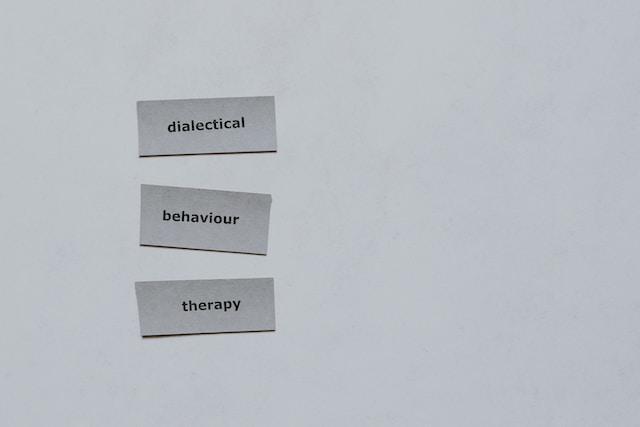DBT London: Where Hope and Healing Intersect for Lasting Change
Wiki Article
Using the Power of Dialectical Behaviour Treatment (DBT) Solutions for Sustainable Psychological Equilibrium and Improved Relationships
In a world where psychological well-being and keeping healthy connections are important parts of a satisfying life, the application of Dialectical Behavior Treatment (DBT) services has arised as a sign of hope for several individuals. The evidence-based and structured technique of DBT uses a pathway in the direction of lasting emotional equilibrium and improved interactions with others. By honing in on core concepts, people can create crucial abilities for controling feelings, enhancing interpersonal effectiveness, and cultivating mindfulness. The true power of DBT exists not simply in comprehending these concepts but in the useful application of approaches in day-to-day life. As we navigate the complexities of human feelings and partnerships, utilizing the capacity of DBT services ends up being a transformative trip worth exploring even more.Recognizing the Core Concepts of DBT
Dialectical Behavior Modification (DBT) is started upon a collection of core principles that underpin its restorative method to promoting emotional equilibrium and mental wellness. Among the fundamental concepts of DBT is dialectics, which emphasizes the synthesis of seemingly opposite concepts to get here at a more well balanced viewpoint. This includes identifying and approving the oppositions and stress within oneself, bring about a higher feeling of harmony and understanding. Mindfulness is one more core principle of DBT, focusing on being fully existing in the moment without judgment. By growing mindfulness, individuals can establish an enhanced awareness of their actions, thoughts, and emotions, permitting greater self-regulation and emotional control.Recognition is also essential to DBT, highlighting the relevance of acknowledging and accepting one's experiences and emotions as valid. By including these core concepts right into therapy, DBT offers a detailed and effective approach to promoting emotional health and mental durability.
Creating Emotional Law Skills
Psychological policy skills are crucial components of Dialectical Habits Therapy (DBT) that allow individuals to efficiently handle their emotions and navigate challenging scenarios with resilience. These skills encompass the ability to recognize and recognize one's feelings, endure distress, manage intense sensations, and act in conformity with personal values also when faced with emotional chaos. Developing psychological guideline skills entails learning mindfulness techniques to remain existing in the minute, comprehending the triggers that bring about emotional dysregulation, and applying coping techniques to modulate emotional feedbacks.

Through DBT solutions, individuals can cultivate a deeper awareness of their feelings, acknowledge patterns of habits that add to psychological distress, and get useful devices to control their feelings constructively. By honing these skills, people can improve their psychological knowledge, improve impulse control, and foster much healthier connections. Eventually, mastering psychological law results in greater emotional stability, increased positive self-image, and a heightened ability to navigate life's challenges with composure and flexibility.
Enhancing Interpersonal Effectiveness
One trick element of boosting interpersonal effectiveness in DBT is discovering to identify and take care of emotions in social interactions (DBT London). By increasing psychological recognition, individuals can react to others in an extra understanding and understanding way. Additionally, DBT highlights the value of exercising mindfulness in interpersonal connections, urging people to be existing in their communications and totally involve with others

Exercising Mindfulness Techniques
Creating a constant mindfulness practice is crucial for people undertaking Dialectical Behavior Therapy (DBT) to cultivate emotional law and enhance their interpersonal effectiveness. Mindfulness methods, a core element of DBT, include focusing on the here and now minute without judgment. look at this site With mindfulness, individuals read the article can end up being more familiar with their ideas, emotions, and physical feelings, permitting them to reply to circumstances with greater quality and control.
One more crucial facet of exercising mindfulness in DBT is the principle of extreme approval. Radical acceptance includes fully embracing reality as it is, even when it is challenging or excruciating. By approving the here and now minute without judgment, people can minimize their suffering and make area for favorable adjustment.
Using DBT Approaches in Day-to-day Live
Building upon the foundation of mindfulness strategies such as meditation and extreme approval, individuals can integrate DBT approaches into their everyday lives to promote psychological equilibrium and enhance their interpersonal abilities. In addition, interpersonal effectiveness skills taught in DBT can assist people connect their demands assertively, set limits, and preserve healthy and balanced relationships. By regularly using these DBT methods in day-to-day life, individuals can experience sustainable emotional balance and enhance their total health.Conclusion
Finally, taking advantage of the power of Dialectical Practices Treatment (DBT) solutions can lead to lasting psychological equilibrium and improved relationships. DBT London. By understanding the core principles of DBT, developing psychological regulation skills, enhancing interpersonal effectiveness, practicing mindfulness techniques, and applying DBT methods in everyday Visit Your URL life, people can experience considerable enhancements in their general wellness and relationships. The alternative method of DBT provides important tools and techniques for managing emotions and developing much healthier connections with othersEmotional law abilities are necessary components of Dialectical Habits Therapy (DBT) that enable individuals to effectively handle their feelings and browse challenging situations with resilience.Via DBT solutions, individuals can cultivate a deeper understanding of their emotions, identify patterns of habits that contribute to psychological distress, and get functional tools to manage their sensations constructively.Developing a consistent mindfulness technique is vital for individuals going through Dialectical Habits Treatment (DBT) to grow emotional law and improve their interpersonal efficiency.Building upon the structure of mindfulness methods such as reflection and extreme acceptance, people can integrate DBT methods right into their everyday lives to foster psychological balance and enhance their interpersonal abilities. By comprehending the core concepts of DBT, establishing psychological policy skills, boosting interpersonal performance, practicing mindfulness methods, and applying DBT methods in everyday life, individuals can experience considerable renovations in their general health and relationships.
Report this wiki page